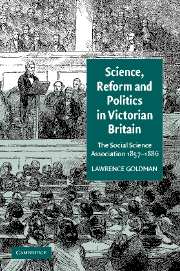Book contents
- Frontmatter
- Contents
- List of illustrations
- Acknowledgements
- Note on citations in the text
- List of abbreviations
- Introduction: the contexts of the Social Science Association
- Part I POLITICS
- Part II REFORM
- Part III SCIENCE
- Chapter 10 Social science in domestic context: popular science, sociology, and a ‘science of reform’
- Chapter 11 Social science in comparative international context
- Part IV DECLINE
- Conclusion: The Social Science Association and social knowledge
- Appendix I The founders of the Social Science Association, 29 July 1857
- Appendix II Social Science Association Congresses, 1857–1884
- Appendix III Presidents of the Social Science Congresses, 1857–1884
- Appendix IV Departmental presidents, 1857–1884
- Select bibliography
- Index
Chapter 11 - Social science in comparative international context
Published online by Cambridge University Press: 22 September 2009
- Frontmatter
- Contents
- List of illustrations
- Acknowledgements
- Note on citations in the text
- List of abbreviations
- Introduction: the contexts of the Social Science Association
- Part I POLITICS
- Part II REFORM
- Part III SCIENCE
- Chapter 10 Social science in domestic context: popular science, sociology, and a ‘science of reform’
- Chapter 11 Social science in comparative international context
- Part IV DECLINE
- Conclusion: The Social Science Association and social knowledge
- Appendix I The founders of the Social Science Association, 29 July 1857
- Appendix II Social Science Association Congresses, 1857–1884
- Appendix III Presidents of the Social Science Congresses, 1857–1884
- Appendix IV Departmental presidents, 1857–1884
- Select bibliography
- Index
Summary
The meaning of ‘social science’ for the mid-Victorians may be analysed further by examining the history of organisations which were consciously modelled on the SSA – the pan-European Association Internationale pour le Progrès des Sciences Sociales, founded in Brussels in 1862, and the American Social Science Association, organised in Boston in 1865. The comparison may be extended to the German Verein für Sozialpolitik, founded in 1872–3, which also shared certain features with the Social Science Association in Britain. In the 1860s there was briefly in existence something like an international ‘social science movement’ in western Europe, the United States, and outposts of empire, though several of the organisations were evanescent.
The very existence of these institutions invites comparison; their exchange of papers, publications, and members necessitates it. Research on the interplay of educational theories and debates that passed between the British and the American Social Science Associations in the 1860s and 1870s has shown their importance as conduits for ideas. But there is a more compelling reason for undertaking such a comparative analysis. Any argument contending that social science or sociology ‘failed’ to develop in nineteenth-century Britain must be predicated on an implicit (if not an explicit) comparison with cultures where it was institutionalised ‘successfully’. This is the form of Anderson's argument and of subsequent attempts to explain this ‘peculiarity of the English’.
- Type
- Chapter
- Information
- Science, Reform, and Politics in Victorian BritainThe Social Science Association 1857–1886, pp. 321 - 346Publisher: Cambridge University PressPrint publication year: 2002



